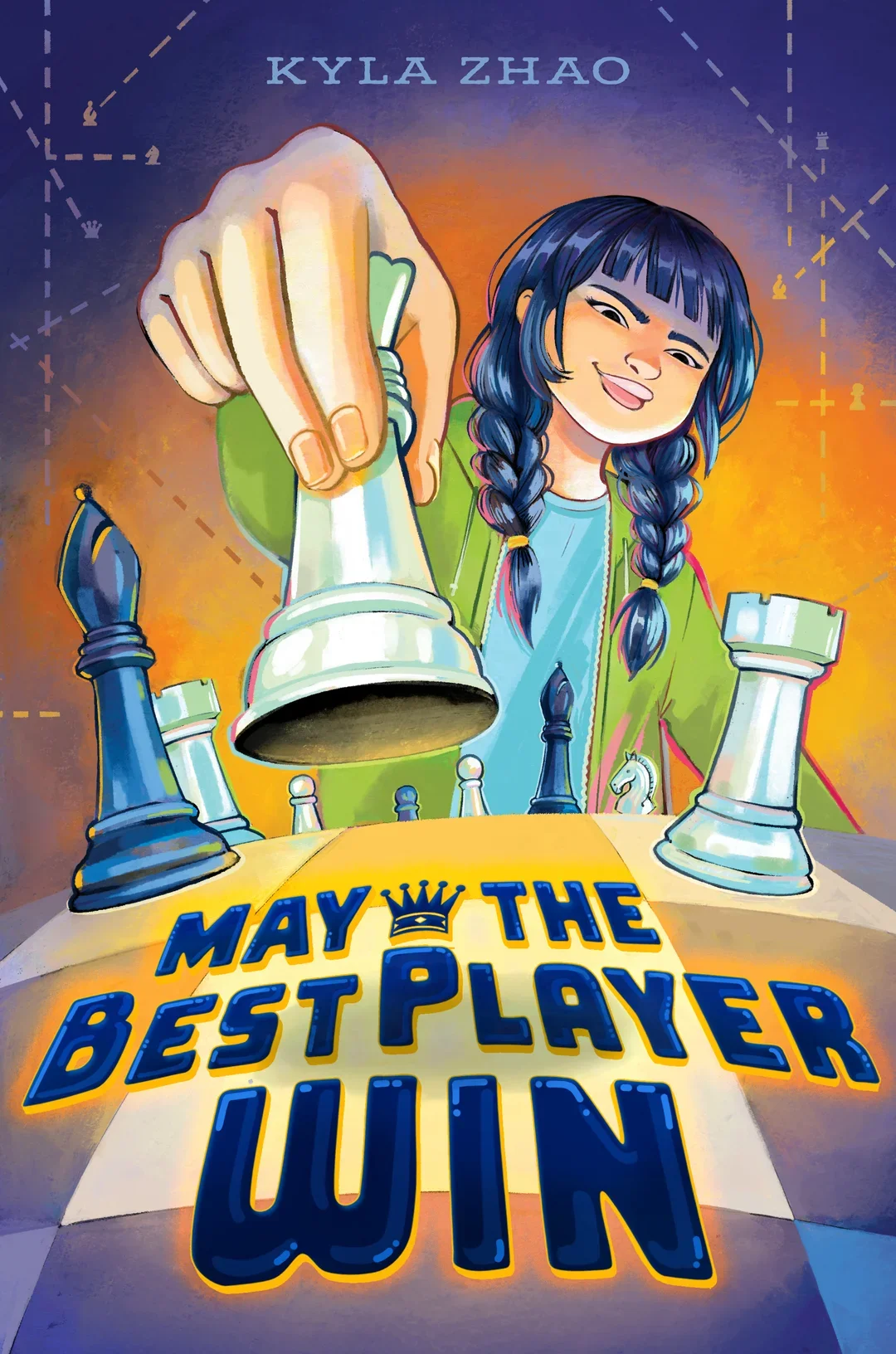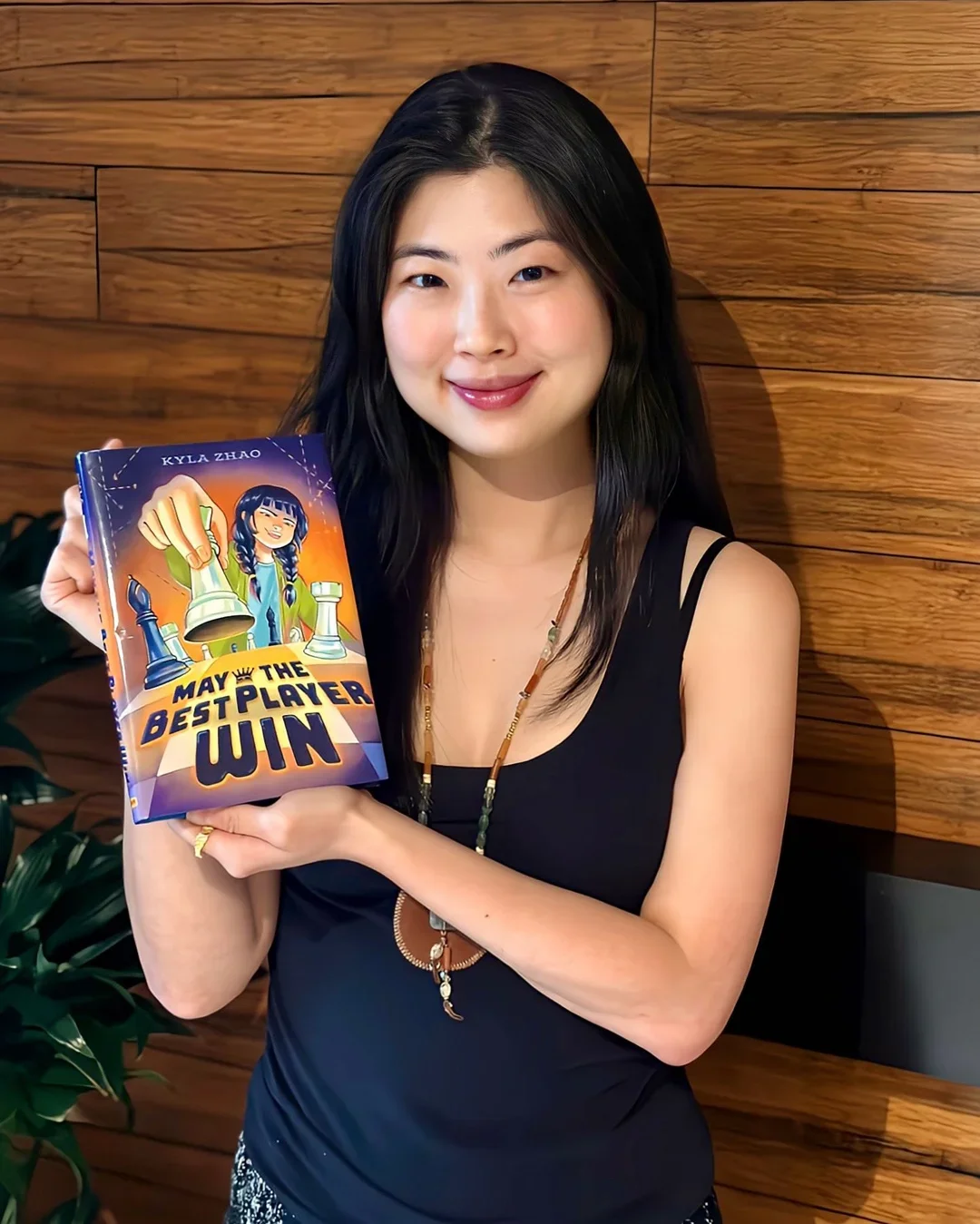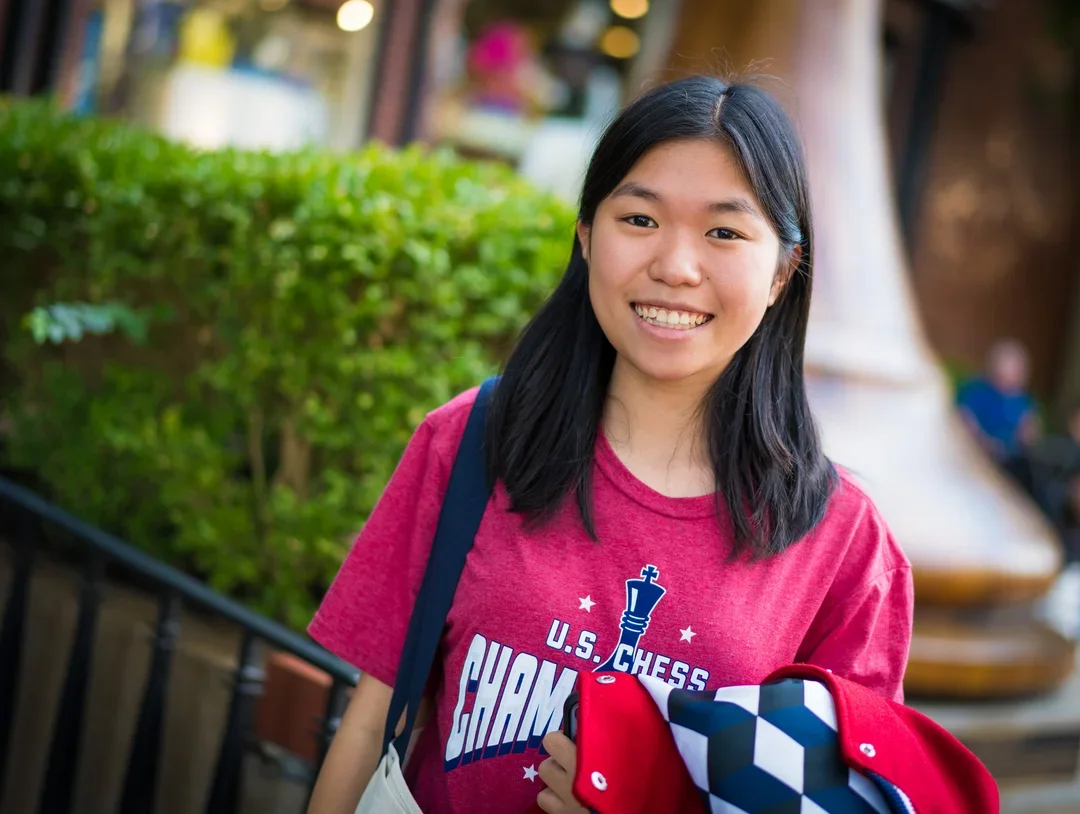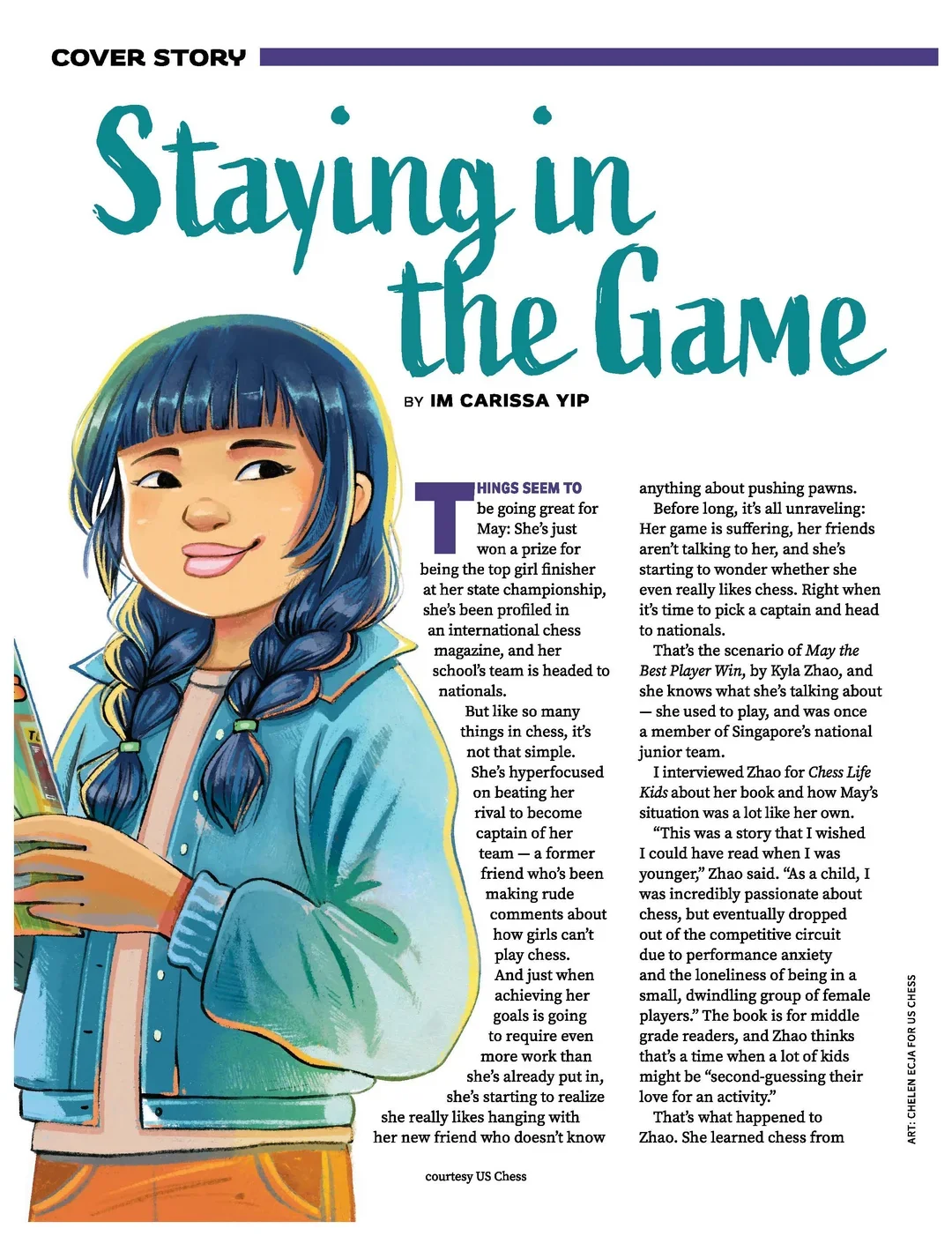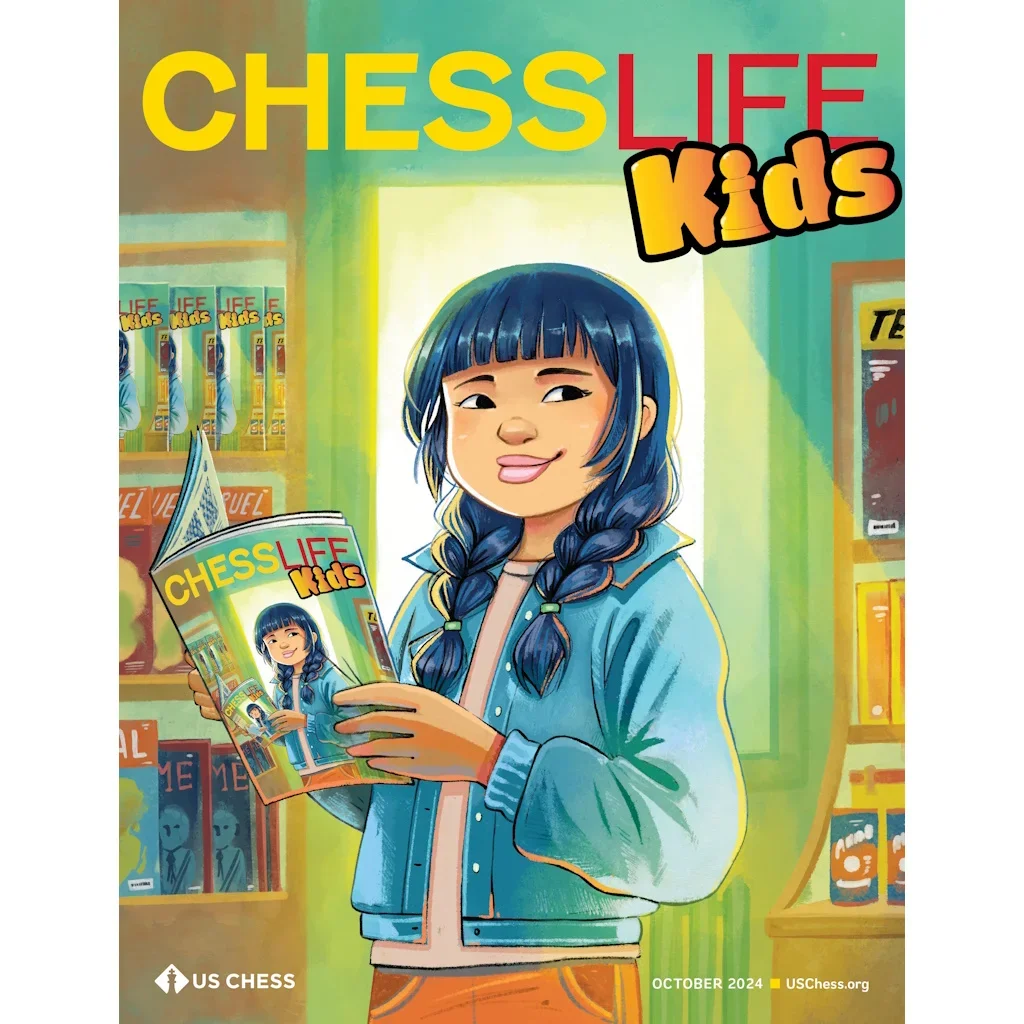Editor's note: This story first appeared in the October 2024 issue of Chess Life Kids magazine. Consider becoming a US Chess member for more content like this — access to digital editions of both Chess Life and Chess Life Kids is a member benefit, and you can receive print editions of both magazines for a small add-on fee. A high-resolution download of this article is available here.
Things seem to be going great for May: She’s just won a prize for being the top girl finisher at her state championship, she’s been profiled in an international chess magazine, and her school’s team is headed to nationals.
But like so many things in chess, it’s not that simple. She’s hyper-focused on beating her rival to become captain of her team — a former friend who’s been making rude comments about how girls can’t play chess. And just when achieving her goals is going to require even more work than she’s already put in, she’s starting to realize she really likes hanging with her new friend who doesn’t know anything about pushing pawns.
Before long, it’s all unraveling: Her game is suffering, her friends aren’t talking to her, and she’s starting to wonder whether she even really likes chess. Right when it’s time to pick a captain and head to nationals.
That’s the scenario of May the Best Player Win, by Kyla Zhao, and she knows what she’s talking about — she used to play, and was once a member of Singapore’s national junior team.
I interviewed Zhao for Chess Life Kids about her book and how May’s situation was a lot like her own.
“This was a story that I wished I could have read when I was younger,” Zhao said. “As a child, I was incredibly passionate about chess, but eventually dropped out of the competitive circuit due to performance anxiety and the loneliness of being in a small, dwindling group of female players.” The book is for middle grade readers, and Zhao thinks that’s a time when a lot of kids might be “second-guessing their love for an activity.”
That’s what happened to Zhao. She learned chess from her grandfather at age six, “and I just really, really enjoyed it. Then, naturally, I just started participating in competitions. But in middle school, I fell out of love with chess.”
A few things happened to make her feel that way: “First, I started questioning if chess is a sport for girls: This was a combination of not seeing many girls around me, some things that top players were saying about female chess players at the time, and not seeing many female role models in high-level chess. So those sowed the seed of doubt about whether competitive chess was really the right place for me. Also, I really enjoyed the social component of learning chess, but with more of my female friends dropping out, I wasn’t really getting the social aspect anymore.”
She also started to wonder what she was doing it all for. At one point in the book, May’s mother asks her, “Are you playing chess to win medals and impress other people, or are you playing chess because you really enjoy it?”
That was a tough question for Zhao too. “Another big reason why my love for chess waned was because I became too focused on winning,” she said. “My pursuit of medals and trophies overshadowed the joy the game used to bring me, until I started feeling anxious every time I sat down in front of a chessboard. It wasn’t a healthy mindset, so I made the decision to stop participating in competitions.”
The same thing starts happening to May too — she fakes being sick to skip her chess lessons and she thinks about withdrawing from the tournament that’s supposed to determine the team captain.
Zhao found a way to stay involved in the game: “Even after I stopped playing chess competitively, I still followed it closely as a spectator. In high school, I interned at the Singapore Chess Federation. I also organized a national tournament for girls there. In hindsight, I think taking a step back from competitive chess is probably why I still love the game now. I needed some distance from it to remember why I loved it in the first place.”
May the Best Player Win is Zhao’s third book, and her first for kids, but she has a full-time job in the tech field and she doesn’t see herself making writing her full-time career. “It’s a passion and a hobby for me,” she said. “If it were to become my only source of income, I would lose some of the joy in writing; I would see it as ‘work-work,’ and I would feel pressure to write what sells.” She explained that her books are all very different, and that’s not what publishers and agents are necessarily looking for.
She started writing May the Best Player Win when she saw a lot of her friends playing chess online during the pandemic. “And it hit me that my college friends don’t even know I used to play chess — I kept that part of myself locked away for so long. So I started reminiscing about all my years in competitive chess, and I wondered: ‘What would have happened if I continued in chess?’ Which led to another question: ‘Why didn’t I continue in chess?’ And so, I started writing to reflect and sort out my own thoughts.”
She’s glad she wrote May the Best Player Win, even though it wasn’t easy and took the same kind of dedicated effort that chess does.
“Of all my books, this one makes me feel the most vulnerable, because it explores something I went through personally,” she said. “After finishing the first draft, I put it to the side and didn’t think about it for a long time. But now it’s finally coming out, four years after I started writing it! … If I read the first draft now, I might not even recognize it.
“It took a long time before I felt like it was ready to be shared, and I hope this story can help and resonate with people.”
May’s problems come to a head, but she works them out by remembering what she loved about chess in the first place, and Zhao hopes that lesson sticks with readers.
“I hope it reminds players, and even non-players, to hold on to their passions, regardless of other people’s expectations and opinions. I hope they always pursue what brings them joy.”
Categories
Archives
- January 2026 (8)
- December 2025 (27)
- November 2025 (29)
- October 2025 (39)
- September 2025 (27)
- August 2025 (29)
- July 2025 (43)
- June 2025 (25)
- May 2025 (24)
- April 2025 (29)
- March 2025 (29)
- February 2025 (20)
- January 2025 (24)
- December 2024 (34)
- November 2024 (18)
- October 2024 (35)
- September 2024 (23)
- August 2024 (27)
- July 2024 (44)
- June 2024 (27)
- May 2024 (31)
- April 2024 (51)
- March 2024 (34)
- February 2024 (25)
- January 2024 (26)
- December 2023 (29)
- November 2023 (26)
- October 2023 (37)
- September 2023 (27)
- August 2023 (37)
- July 2023 (47)
- June 2023 (33)
- May 2023 (37)
- April 2023 (45)
- March 2023 (37)
- February 2023 (28)
- January 2023 (31)
- December 2022 (23)
- November 2022 (32)
- October 2022 (31)
- September 2022 (19)
- August 2022 (39)
- July 2022 (32)
- June 2022 (35)
- May 2022 (21)
- April 2022 (31)
- March 2022 (33)
- February 2022 (21)
- January 2022 (27)
- December 2021 (36)
- November 2021 (34)
- October 2021 (25)
- September 2021 (25)
- August 2021 (41)
- July 2021 (36)
- June 2021 (29)
- May 2021 (29)
- April 2021 (31)
- March 2021 (33)
- February 2021 (28)
- January 2021 (29)
- December 2020 (38)
- November 2020 (40)
- October 2020 (41)
- September 2020 (35)
- August 2020 (38)
- July 2020 (36)
- June 2020 (46)
- May 2020 (42)
- April 2020 (37)
- March 2020 (60)
- February 2020 (38)
- January 2020 (45)
- December 2019 (34)
- November 2019 (35)
- October 2019 (42)
- September 2019 (45)
- August 2019 (56)
- July 2019 (44)
- June 2019 (35)
- May 2019 (40)
- April 2019 (48)
- March 2019 (61)
- February 2019 (39)
- January 2019 (30)
- December 2018 (29)
- November 2018 (51)
- October 2018 (45)
- September 2018 (29)
- August 2018 (49)
- July 2018 (35)
- June 2018 (31)
- May 2018 (39)
- April 2018 (31)
- March 2018 (26)
- February 2018 (33)
- January 2018 (30)
- December 2017 (26)
- November 2017 (24)
- October 2017 (30)
- September 2017 (30)
- August 2017 (31)
- July 2017 (28)
- June 2017 (32)
- May 2017 (26)
- April 2017 (37)
- March 2017 (28)
- February 2017 (30)
- January 2017 (27)
- December 2016 (29)
- November 2016 (24)
- October 2016 (32)
- September 2016 (31)
- August 2016 (27)
- July 2016 (24)
- June 2016 (26)
- May 2016 (19)
- April 2016 (30)
- March 2016 (36)
- February 2016 (28)
- January 2016 (32)
- December 2015 (26)
- November 2015 (23)
- October 2015 (16)
- September 2015 (28)
- August 2015 (28)
- July 2015 (6)
- June 2015 (1)
- May 2015 (2)
- April 2015 (1)
- February 2015 (3)
- January 2015 (1)
- December 2014 (1)
- July 2010 (1)
- October 1991 (1)
- August 1989 (1)
- January 1988 (1)
- December 1983 (1)


